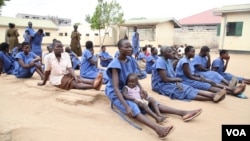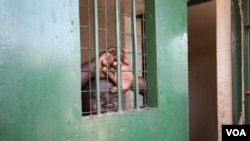JUBA, SOUTH SUDAN —
Rights groups are calling for a moratorium on the death penalty in South Sudan, the world’s newest nation where the legal system may be sending people to the gallows who have not been granted basic rights and may well be innocent.
The clinking of shackles has followed 45-year old Mary Sezerina for seven years, reminding her of a crime she says she committed when not of sound mind.
Speaking through a translator, Widow Sezerina says that she killed her sister-in-law in the heat of the moment, on one of her trips to steal things from the family home as Sezerina was struggling to feed five young children.
“She says that that time she killed was the devil’s intention and it was stronger than me," said the translator. "Now that she is in prison, her heart is free and she has nothing against this person and the other relatives, but this is the life," she said.
No legal aid
Under South Sudanese customary law, Sezerina could have paid for her blood crime in cows. But a lack of money meant she had to go to court, and without a lawyer.
There, she says there was no opportunity to try and save herself from the gallows.
Jehanne Henry, Africa Researcher for Human Rights Watch, says that the vast majority of those put on death row never had a chance to defend themselves in court, where proceedings are often carried out in a language they don’t speak.
"There are not very many lawyers operating in South Sudan and people sometimes don’t know what the role of lawyers is, but it is very clear that some of the people that are sentenced to death don’t understand the legal system in which they have been sentenced - they do not know how to defend themselves," said Henry.
Some people in Juba prison admit they killed, but claim factors like self-defense, the line of duty or a crime of passion - all factors that never came up in court where they said they were speechless or silenced.
Others are baffled at how they have been branded murderers, claiming they were not at the scene of the crime and there were no eyewitnesses or evidence to implicate them, but that finger pointing by relatives was enough.
David Deng, of the South Sudan Law Society, says that meting out capital punishment without legal representation is unacceptable.
“No one knows whether innocent people are being executed. Much less, it’s not even a question of guilty or innocent, there could be any number of mitigating circumstances that aren’t being considered because the accused isn’t in a position to build his case," he said.
Weak justice system
The government admits that police are poorly trained and there are very few judges, with varied and often little experience, but denies that innocent or not legally culpable people are slipping through these ”loopholes.”
Stella Juwa Felix didn’t even get a chance to deny shooting her husband in the head as he slept, let alone say that she had never fired a gun or find out why three other suspects that did have the money for lawyers had been released.
Like many, she says the words of the accusers were final in a trial that took five minutes.
“I’m here because someone shoot my husband at home. I’m sleeping inside, and my husband sleep outside. So I found him at morning - he died. And I called his parents. The parents came there (and decided) that I’m the one. They took me in court - that is why they have judged me like this," she said.
Deng says that South Sudan’s rebel movement-turned government used death by firing squad during the war to control the population - and it’s not ready to let go.
"I think some of that mentality has stuck around after independence, when the policy makers, the leaders, look at society, they see people who are traumatized by conflict and they think the only way to control this population is through strict measures, and so for them capital punishment is an indispensable deterrent to try to keep a lid on some of the crime in South Sudan," he said.
Rights groups Amnesty International and Human Rights Watch say that more than 200 people are thought to be on death row in South Sudan, and half of them are languishing in cramped, dirty cells in the capital.
Death row
Only six of them received legal aid, breaking international standards stating that the death penalty should only be imposed “when the guilt of the person charged is based upon clear and convincing evidence leaving no room for an alternative explanation of the facts.”
Henry hopes that South Sudan will vote for a moratorium on the death penalty at an upcoming UN general assembly,
“South Sudan as a new country has a nascent justice system that has many weakness and it is simply incapable of providing people with their basic due process rights. South Sudan should place a moratorium on the death penalty, not only because the death penalty is in and of itself is an affront to human rights, but also because it operates a system that cannot protect people’s basic rights,” said Henry.
But until South Sudan calls a halt to executions, rights group fear that hundreds more people will find themselves shackled to a fate they had no chance of escaping.
The clinking of shackles has followed 45-year old Mary Sezerina for seven years, reminding her of a crime she says she committed when not of sound mind.
Speaking through a translator, Widow Sezerina says that she killed her sister-in-law in the heat of the moment, on one of her trips to steal things from the family home as Sezerina was struggling to feed five young children.
“She says that that time she killed was the devil’s intention and it was stronger than me," said the translator. "Now that she is in prison, her heart is free and she has nothing against this person and the other relatives, but this is the life," she said.
No legal aid
Under South Sudanese customary law, Sezerina could have paid for her blood crime in cows. But a lack of money meant she had to go to court, and without a lawyer.
There, she says there was no opportunity to try and save herself from the gallows.
Jehanne Henry, Africa Researcher for Human Rights Watch, says that the vast majority of those put on death row never had a chance to defend themselves in court, where proceedings are often carried out in a language they don’t speak.
"There are not very many lawyers operating in South Sudan and people sometimes don’t know what the role of lawyers is, but it is very clear that some of the people that are sentenced to death don’t understand the legal system in which they have been sentenced - they do not know how to defend themselves," said Henry.
Some people in Juba prison admit they killed, but claim factors like self-defense, the line of duty or a crime of passion - all factors that never came up in court where they said they were speechless or silenced.
Others are baffled at how they have been branded murderers, claiming they were not at the scene of the crime and there were no eyewitnesses or evidence to implicate them, but that finger pointing by relatives was enough.
David Deng, of the South Sudan Law Society, says that meting out capital punishment without legal representation is unacceptable.
“No one knows whether innocent people are being executed. Much less, it’s not even a question of guilty or innocent, there could be any number of mitigating circumstances that aren’t being considered because the accused isn’t in a position to build his case," he said.
Weak justice system
The government admits that police are poorly trained and there are very few judges, with varied and often little experience, but denies that innocent or not legally culpable people are slipping through these ”loopholes.”
Stella Juwa Felix didn’t even get a chance to deny shooting her husband in the head as he slept, let alone say that she had never fired a gun or find out why three other suspects that did have the money for lawyers had been released.
Like many, she says the words of the accusers were final in a trial that took five minutes.
“I’m here because someone shoot my husband at home. I’m sleeping inside, and my husband sleep outside. So I found him at morning - he died. And I called his parents. The parents came there (and decided) that I’m the one. They took me in court - that is why they have judged me like this," she said.
Deng says that South Sudan’s rebel movement-turned government used death by firing squad during the war to control the population - and it’s not ready to let go.
"I think some of that mentality has stuck around after independence, when the policy makers, the leaders, look at society, they see people who are traumatized by conflict and they think the only way to control this population is through strict measures, and so for them capital punishment is an indispensable deterrent to try to keep a lid on some of the crime in South Sudan," he said.
Rights groups Amnesty International and Human Rights Watch say that more than 200 people are thought to be on death row in South Sudan, and half of them are languishing in cramped, dirty cells in the capital.
Death row
Only six of them received legal aid, breaking international standards stating that the death penalty should only be imposed “when the guilt of the person charged is based upon clear and convincing evidence leaving no room for an alternative explanation of the facts.”
Henry hopes that South Sudan will vote for a moratorium on the death penalty at an upcoming UN general assembly,
“South Sudan as a new country has a nascent justice system that has many weakness and it is simply incapable of providing people with their basic due process rights. South Sudan should place a moratorium on the death penalty, not only because the death penalty is in and of itself is an affront to human rights, but also because it operates a system that cannot protect people’s basic rights,” said Henry.
But until South Sudan calls a halt to executions, rights group fear that hundreds more people will find themselves shackled to a fate they had no chance of escaping.









